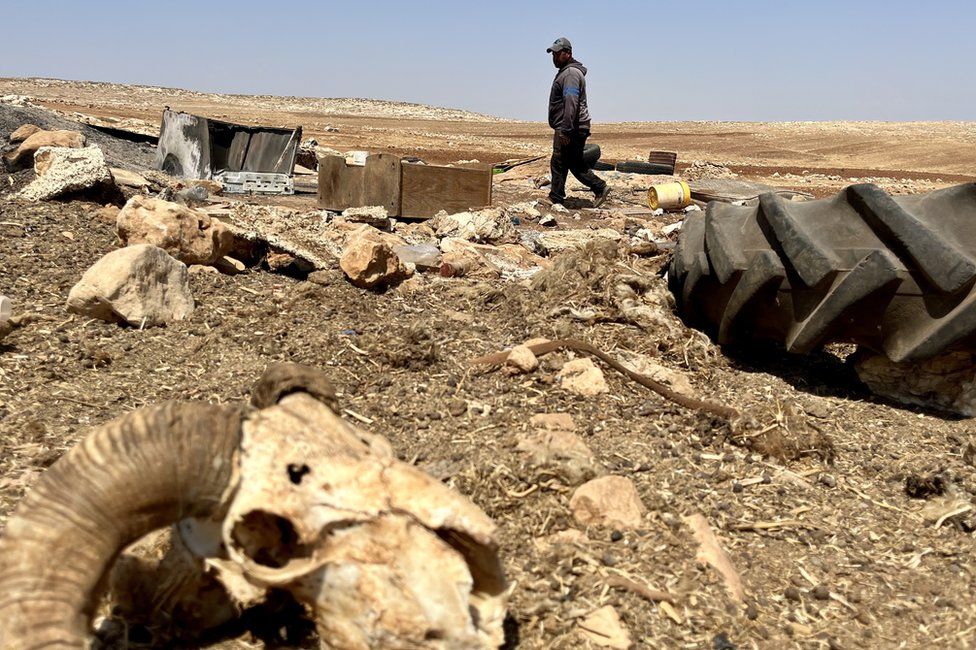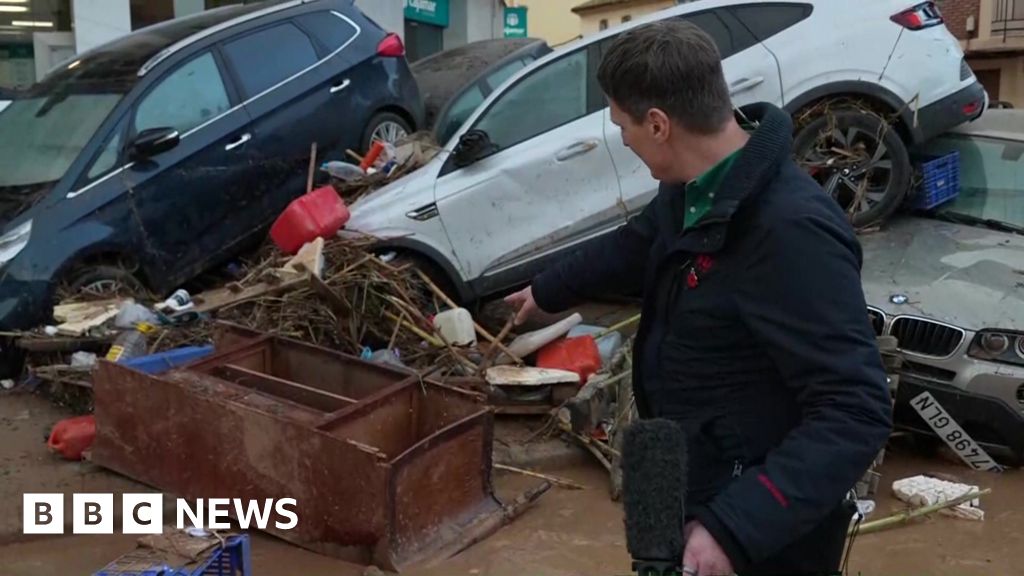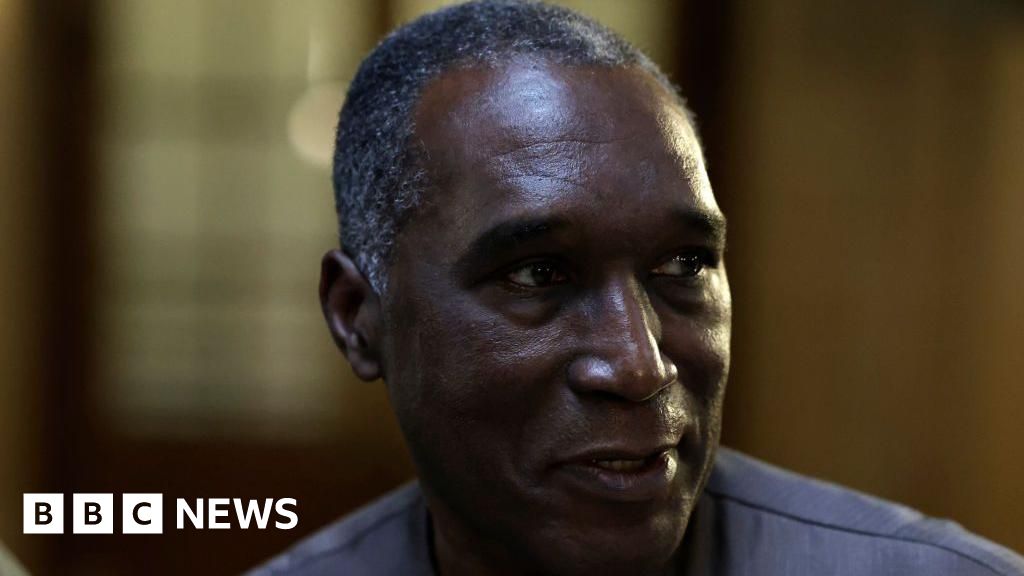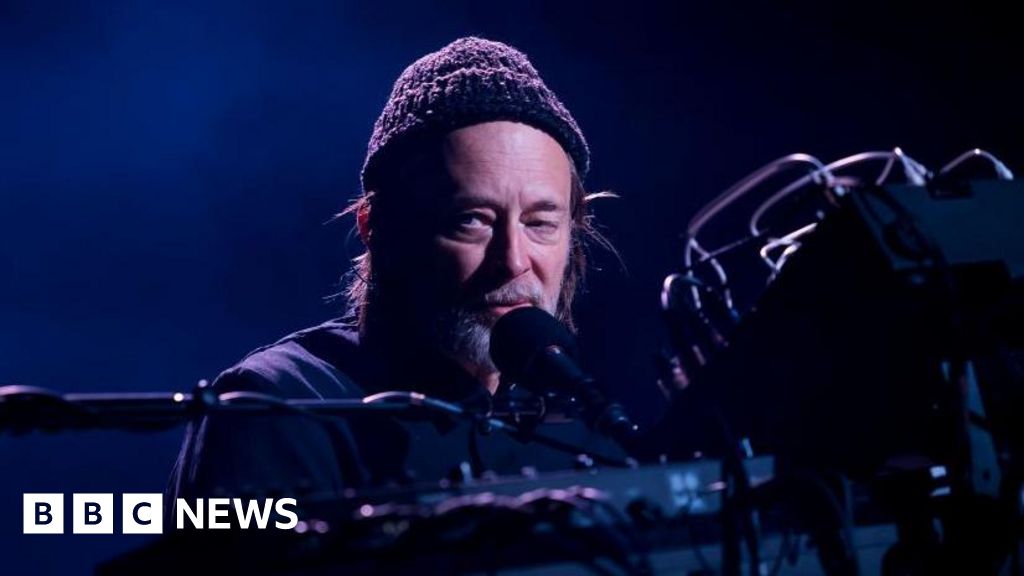ARTICLE AD BOX

Farmer Abu Ammar Alia is one of many Palestinians forced to abandon his home
By Yolande Knell
BBC News, Ramallah
There's been a dramatic rise in violence carried out by extremist Israeli settlers against Palestinian civilians in the occupied West Bank this year, with more than 100 incidents reported a month according to the UN. It warns that some 400 people have been driven from their land since the start of 2022.
Smashed cars and homes and shops set ablaze. Recent months have seen some of the worst ever scenes of settler violence in the occupied West Bank.
Posters in remembrance of 19-year-old Qusai Maatan, showing him astride his white Arabian horse, now surround a small roundabout in the village of Burqa, set among olive trees in the rolling hills north-east of Ramallah.
"He had a deeply caring nature. He'd always greet me warmly and check on me in a thoughtful way," says his grandfather, Abdul Moneim Maatan, his voice cracking. "His absence leaves a huge void."
On the evening Qusai was shot dead by an armed settler, his family say he had gone for a picnic with friends at the edge of the village. Locals describe how a confrontation with radical Israelis living nearby escalated quickly. Stones were thrown and at least one settler opened fire. In an unusually strong rebuke, Israel's closest ally, the US, described what happened here as "Jewish terrorism".
Qusai Maatan's grandfather says the teenager's death leaves a huge void
Two Israeli settlers and at least five Palestinians were arrested by Israeli security forces, who say they are still investigating the incident.
Settler attacks have become more common, says a young relative of Qusai, who is afraid to give her name.
"No-one knows who the next Qusai is going to be," she adds. "No-one is going to protect us. If, God forbid, there are any other confrontations or attacks, our government can't legally do anything."
While the Palestinian Authority (PA) governs in big Palestinian cities, Israel retains near exclusive control of 60% of the West Bank (known as Area C), presiding over law enforcement, planning and construction. An estimated 370,000 Palestinians live in Area C, which includes Burqa, and half a million Israeli citizens. Israel's new government, its most right-wing and nationalist to date, has openly declared its intention to double the number of settlers to one million.
Most of the world sees settlements as illegal under international law, though Israel disagrees.
Already 2023 has set an all-time record for settlement construction in the West Bank and for the legitimisation of outposts, according to settlement watchdog Peace Now. Outposts are often set up with a wink and a nod from Israeli authorities but without official permission.
In recent months, the Israeli government - which includes long-time settler activists in key cabinet posts - has completed or begun to legalise 15 settler outposts that were previously illegal under Israeli law, Peace Now says.
What looks like an official signpost leads me to the settler outpost of Oz Zion in an olive grove on a hilltop above Burqa. It was built on privately owned, officially registered land belonging to Palestinians in the village. There is a collection of white, prefabricated buildings, a rudimentary play area for the young children of six families which I am told now live here, and a pen of sheep.
Yehuda Lieber says settlers aim to halt the creation of a Palestinian state
"Our vision is that all of the land of Israel will be settled with Jews. It's our basic right. Our right is in the Bible," says Yehuda Lieber, a 26-year-old father of two. He is encouraged by the fact that some of those in government share his ideology and believes that eventually Israel will retroactively authorise his outpost.
"We have an expectation from the government that was elected by right-wing votes to settle the land, expand the settlements, and not hurt them," he says.
With a series of new outposts recently set up, he tells me the settlers' strategy is to block Palestinian statehood. Creating an independent Palestinian state in the West Bank and Gaza, with East Jerusalem as its capital, is a long-time goal of the internationally backed two-state solution to end the decades-old Israel-Palestinian conflict.
"What we're doing here and in other places that exist is to halt the establishment of the Palestinian state, which is being built in practice without asking anyone," Mr Lieber says.
Anti-occupation groups argue that as settlers have become emboldened by the current Israeli coalition government, settler attacks on Palestinians and their property have risen to a record high. The trend comes against the background of a surge in tensions in the West Bank this year, with near-nightly Israeli military raids and a spate of Palestinian assaults.
It has been the deadliest year for Palestinians and Israelis here for nearly two decades. More than 180 Palestinians have been killed in the territory - mostly fighters, but also many civilians, according to figures collated from PA sources. On the Israeli side, some 32 people have been killed, nearly all civilians - about half in the West Bank, excluding East Jerusalem.
Some deadly Palestinian militant attacks have led to violent rampages carried out in revenge by settlers, as seen in Huwara in February, following the shooting of two brothers from a nearby settlement, and Turmus Ayya in June, after four settlers were killed outside a petrol station. Both of those assaults left a Palestinian dead. The top Israeli military spokesman recently commented that the spike in settler attacks, which he called "nationalist terrorism", was in turn driving Palestinians to attack Israelis.
Official figures from Israel's internal security agency registered a 15% increase in individual Palestinian attacks on civilians and soldiers across Israel and the Occupied Territories in the first seven months of the year compared to the same period last year. In 2022, the agency counted 1,317 uses of fire or pipe bombs, shootings, arson, and stabbings compared to 1,522 in 2023.
Israeli security forces have come under increased scrutiny with the rise in settler violence. They are often criticised for failing to intervene effectively and sometimes for apparently supporting acts of harassment.
Driven from his home, Abu Ammar Alia now keeps his sheep on temporarily rented land
The UN's humanitarian agency (OCHA) says it has registered over 700 incidents this year where settler violence has resulted in Palestinian casualties, damage to property or both. The number is the highest since it began recording such acts in 2006.
"Just to give you an idea, in 2021 there was an average of one incident of settler violence a day that we were recording. In 2022, there were two incidents of settler violence and in 2023 we have an average of three incidents of settler violence a day," says Andrea De Domenico, head of OCHA's West Bank office.
Mr de Domenico warns that Palestinian Bedouin and other herding communities in Area C are particularly vulnerable.
"We're seeing more and more pressure on Palestinian communities to leave their land," he tells me. "Recently there are three communities that have been completely removed."
At the start of August, the remaining families from al-Qabun, a herding community in the central West Bank, dismantled their homes and sheep pens to move to safer places. A total of 89 people were forced away, blaming Israeli demolition threats and settler intimidation.
"They used to stop outside our house at midnight and honk their car horns or send kids to harass us. They would scare the sheep and block them in, or empty out our water tank," says Ammar Abu Alia.
He worries for the future as he squeezes more than 100 of his flock into a pen on land which he is only able to rent temporarily. "What will we do?" he asks. "We'll be forced to sell. We'll have no livelihood."
Nidar, a mother of nine, says the world seems unaware of the displacement of Palestinians
Like the rest of her extended family, Nida Abu Alia - Ammar's sister - is now living in cramped accommodation in a village close to the land they lived on for generations. The mother of nine is bitter about the relative lack of attention paid to her community's plight.
"People said that this is Area C, but that's not right. It's the land of Palestine," she says. "Our displacement is a great loss. People must realise what's happening. If they don't, we will lose a lot."
Human rights groups warn that the forced transfer of Palestinians from their homes on occupied land could amount to a war crime by Israel, if it is proven that official steps amount to coercion.
At the same time, settlers and their supporters in the Israeli government are seeking to take advantage of the new political reality. Huge investment is planned to expand settlements and improve their infrastructure, cementing a Jewish presence in the West Bank and changing the landscape.
With their own leaders too weak to effect a serious change in course and a sense that settlers enjoy impunity, Palestinian anger and resentment is growing.
The ongoing developments only look set to deepen bitter hostilities.

 1 year ago
34
1 year ago
34








 English (US)
English (US)